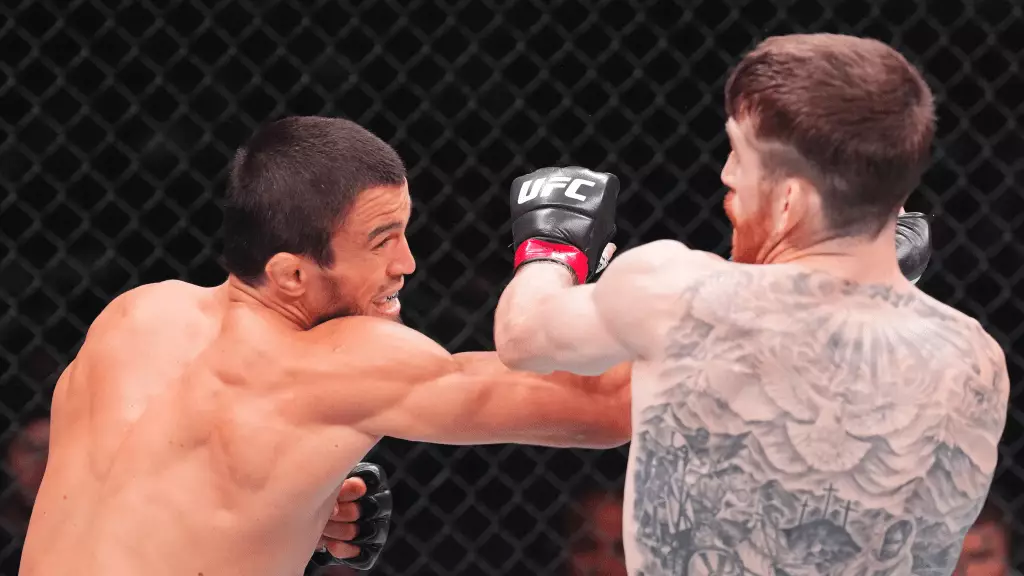Cory Sandhagen, a prominent fighter in the UFC bantamweight division, is not just a mere spectator ahead of the anticipated match at UFC 311. As Umar Nurmagomedov prepares to face bantamweight champion Merab Dvalishvili on January 18, 2024, Sandhagen has voiced both his support and conviction in Nurmagomedov’s ability to dominate this matchup. Having endured a decision loss to Nurmagomedov in August at UFC on ABC 7, Sandhagen possesses firsthand insights into Nurmagomedov’s skill set and resilience. His confidence in Nurmagomedov’s potential victory goes beyond the personal rivalry, as he also addresses the structural dynamics of the fight, projecting an intriguing narrative for fans.
In assessing the matchup, Sandhagen’s evaluation provides an analytical lens through which we can explore the juxtaposition between the styles of Nurmagomedov and Dvalishvili. Sandhagen expresses skepticism regarding Dvalishvili’s ability to neutralize Nurmagomedov, particularly when it comes to striking prowess and takedown defense. He intimates that Dvalishvili’s strategy, previously effective against opponents like Sean O’Malley, may be less viable against the sharp and adaptive fighting approach of Nurmagomedov. Sandhagen emphasizes, “I don’t really see a path for Merab to win,” suggesting that Dvalishvili may struggle to impose his wrestling while contending with Nurmagomedov’s striking dominance.
Sandhagen further underscores Nurmagomedov’s agility and fight IQ, describing him as a “sniper” adept at using speed and precision to his advantage. Such language encapsulates the anticipation surrounding the bout, as fans eagerly await glimpses of Nurmagomedov’s striking proficiency that has thus far gone unchallenged in the UFC.
Moreover, Sandhagen does not shy away from critiquing Dvalishvili’s dismissive attitude toward Nurmagomedov, labeling it as “ridiculous.” This aspect of the narrative adds a layer of drama, as it reflects a common tension in professional sports where challengers and champions often seem to dance around the potential for direct confrontation. Sandhagen’s commentary suggests that fans crave authenticity in competition—fearlessness in accepting challenges rather than sidestepping them. He points to a larger behavioral trend within the sport: fans desire athletes who exhibit humility and respect toward potential opponents, rather than those who discredit their capabilities.
The Impact of Pre-Fight Sentiments
Such behavior extends beyond mere tactical analysis; it signifies a cultural heartbeat within the sport that is often overlooked. The desire for sincere competitors resonates with audiences who relish genuine rivalries and compelling storylines. Sandhagen’s sentiments echo this understanding, portraying the fight as not just a physical confrontation but a narrative enriched by respect and the pursuit of greatness. “Fans want to be inspired,” he notes, pinpointing that the hype surrounding a fight is often rooted in the fighters’ willingness to take on formidable challenges.
A Fight That Promises to Deliver
As UFC 311 approaches, excitement continues to mount. Both Nurmagomedov and Dvalishvili are at pivotal junctures in their careers. The bout promises to be a test of resolve, skill, and the ultimate display of MMA artistry. Sandhagen’s insights provide an engaging backdrop, revealing not just the mechanics of the bout, but also the broader implications for the sport and its fanbase.
The upcoming fight is more than a clash for a title; it’s an exploration of the competitive spirit of modern mixed martial arts. Cory Sandhagen’s analysis serves as both a critical examination of fight dynamics and a reflection on the values that underpin the fan experience. As the date draws near, audiences can only hope this matchup will fulfill their desire for thrilling, high-caliber competition that inspires and captivates.

